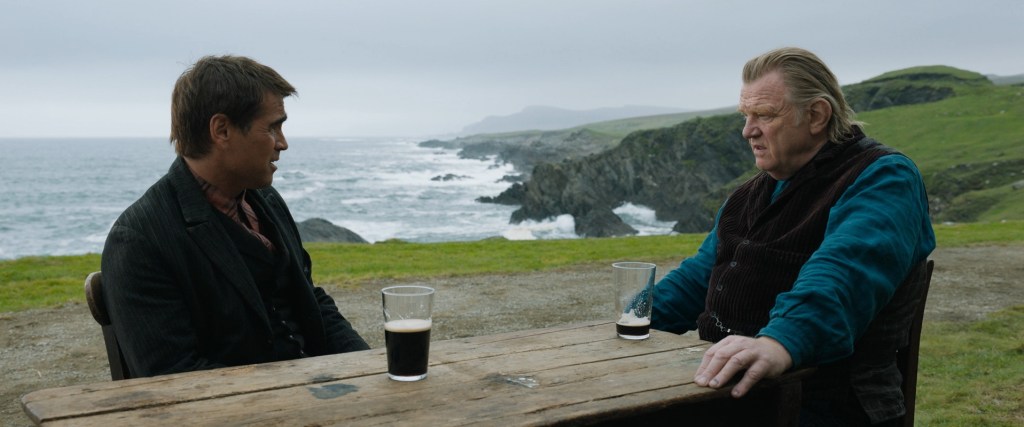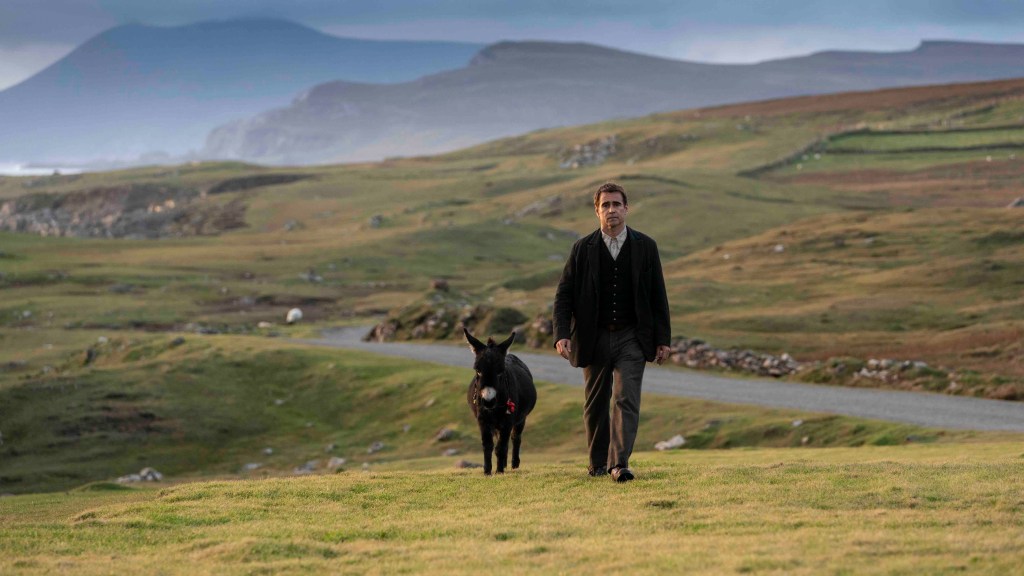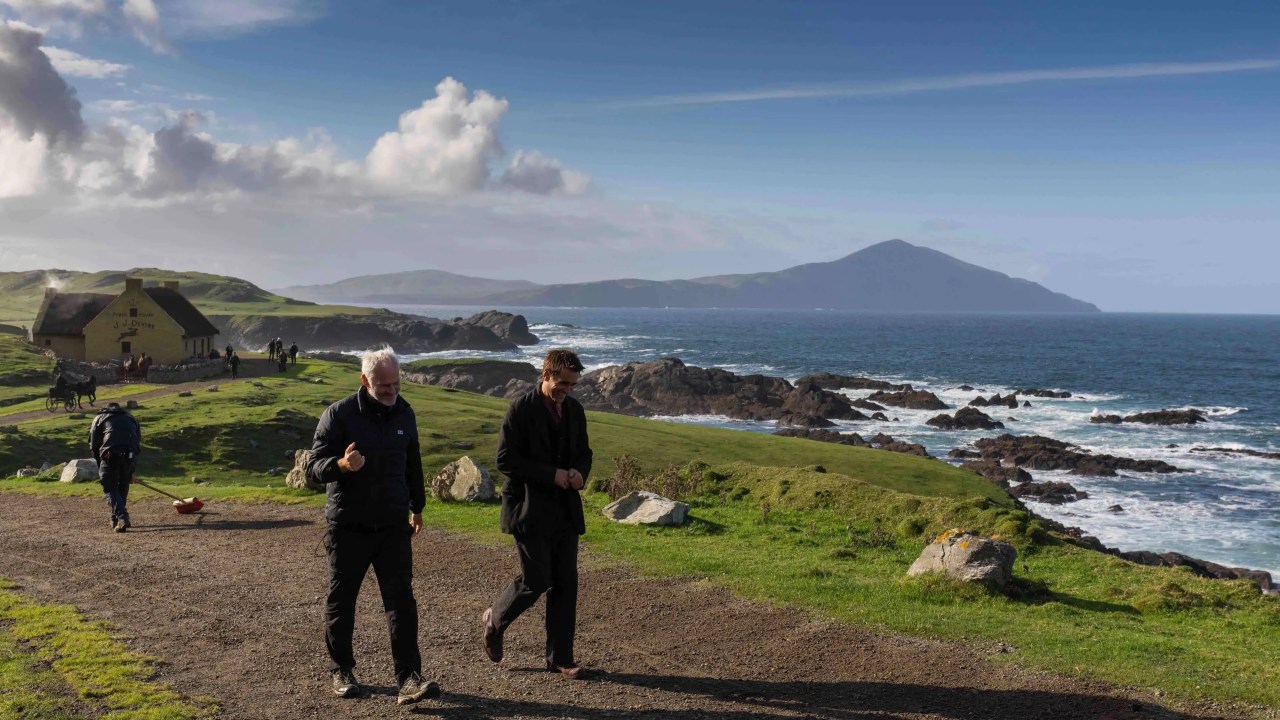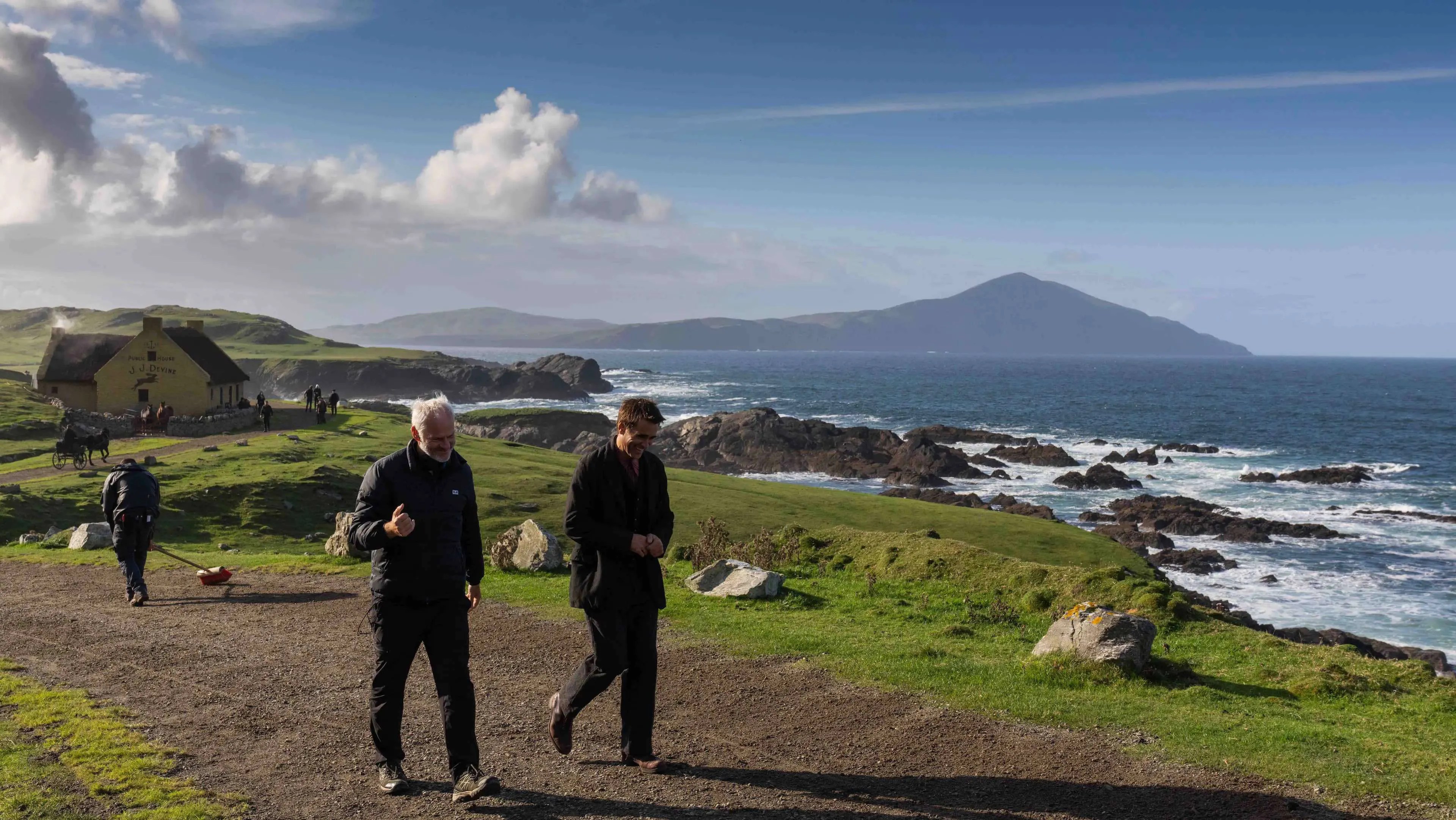It’s a rocky rural idyll on the edge of the Atlantic Ocean. The craggy sea cliffs – Europe’s highest – are swathed in the orange setting sun. Animals – sheep, cows, donkeys – gambol rather than walk on the ancient bog and jump over the babbling brooks. The sand is golden, the ocean as green as the land. Even when it’s lashing down, there’s a rainbow framing the fleet of three fishing boats in the quaint harbour.
This verdant set for Martin McDonagh’s new film The Banshees of Inisherin is actually a sea-washed, beach-framed, dry-stone-walled island called Achill, off County Mayo on the West Coast of Ireland. (Inisherin literally translates as ‘Island Ireland’.) But despite its natural beauty, this island isn’t portrayed as a utopia. The Banshees is a story of a riven community soaked in alcohol and drowning in crushed dreams. Pádraic (Colin Farrell) and Colm (Brendan Gleeson) may be best friends, but their petty feud escalates into near unwatchable violence. Padraic’s sister Siobhan (Kerry Condon) is doomed to die a spinster as the island men, she says, are stupid, or boring, or both. She advises her brother there’s ‘nothing for you on Inisherin apart from more bitterness and spite’.
The island is no more than a beautiful backdrop for these thwarted lives. It’s a familiar fictional tale of rural Irish misery, shared by generations of Hollywood script-writers from 1970’s Ryan’s Daughter through 1982’s The Ballroom of Romance onwards. No one would ever want to live in such a wretched, despairing, lonely spot.

But I do. Achill is my home. From where I’m sitting as I write, I can see the beach where Colm and Padraic walked, argued then threatened each other’s lives. Now there are only three people on the two-mile stretch. One throws something – I think it’s a bit of driftwood they’ve just picked up – to their circling dog. They aren’t arguing. They’re enjoying their walk. Achill, unlike its fictional film archetype Inisherin, isn’t a hellhole of lost dreams.
The island is no more than a beautiful backdrop for these thwarted lives. It’s a familiar fictional tale of rural Irish misery, shared by generations of Hollywood script-writers
So isn’t it time Hollywood let us be happy? There’s plenty of proof that we Irish island inhabitants are just that. Look at the figures. Ireland is ranked 13th happiest country in the world, three places ahead of the United States and four above the United Kingdom, according to the UN’s latest World Happiness Report. According to the same report, under 5 per cent of the Irish population work very long hours, compared with the average 13 per cent. The rate of violent crime is low throughout the country, but particularly low on Achill and other islands. And while the winter storms might bring the cables down from the telegraph poles and cut off power, our mild Gulf Stream climate means we don’t need to worry about big natural disasters.
Keem bay, where Colm in The Banshees lives, has been voted number three beach in the world on several occasions, as well as top swimming spot. There’s been a dedicated year-round wild swimming group on the island since far before dry robes were discovered. The filmmakers built a charming two-storey cottage on the beach where we dip. How lovely, we thought. But it was built for the part in a plot where it’s maliciously burnt down.

Every bit of our daily island life is dissected and destroyed. Take, for example, the stage for all the best Irish tragedies – the pub. On Achill’s Atlantic Drive, above the cliffs, The Banshees’ set-makers constructed a bar, painted it a gorgeous terracotta and fitted it out with heavy dark wooden tables and chairs, flagstone floors and tiny windows. We joked it was the best bar on the island, even though we weren’t allowed inside. But little did we know the despair it was to house within. It’s where all the utter grief of Inisherin life is acted out.
That’s not island pub life as I know it. Just yesterday I was at my local, with a turf fire and glass of Guinness, in the company of two fiddlers, one Uilleann pipe player and a singer. It may read as a cliché, but such music sessions are common here. These evenings aren’t put on for anyone but ourselves. Most of the musicians sit with their backs to the drinkers, concentrating on their breath and strings, not caring if they’re praised or ignored. They, and we, are just passing a pleasant night with a pint.
You don’t need to take my word for it that where I live is wonderful. For the first time in decades, Ireland’s rural populations are increasing. People want to live here. During lockdown and the remote-working boom it seemed as if Google HQ was relocating to the island, as IT workers in $50 T-shirts flocked to find a new place to root their routers. Only the appalling internet connection caused them to leave. A smattering remain and, dare I say it, seem happy.
McDonagh’s grim tale is tipped for Oscars – rewards for a yet another film showing an Irish island as a place of natural wonder and personal woes. But let’s reel in the wretchedness. Please shed a tear not for our daily plight, but for our portrayal on the big screen.







Comments